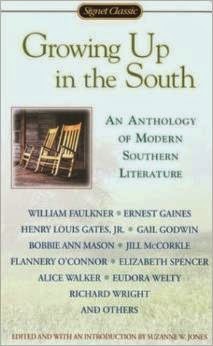Deal Me In Lite, Week 9: "Everyday Use" by Alice Walker
This week the three of diamonds sends us back down south, to the Growing Up in the South anthology and a story by Alice Walker, of The Color Purple fame. I actually have never read anything by Alice Walker, so I was very interested to read this story, and it did not disappoint.
The narrator of the story, an older, hard-working black woman who never reveals her name, lives in the country with her daughter Maggie under the most basic of conditions. They are clearly poor, but it is a condition that suits her and Maggie because they farm and have simple lives with all of their basic needs met, and they seem generally happy. The narrator has another daughter, Dee, who was never satisfied with their lifestyle in the country and was always wanting something better, to break away from her rural existence. The narrator makes it clear that Dee was essentially ashamed of the family and where she came from. She even looked on in glee as their family home burned to the ground when she was a child, even though Maggie was seriously burned in the fire.
Now, however, when the story opens, Dee is coming back to her home for a visit as an adult, and everything has been made as nice as it possibly can be to welcome her. The narrator longs to obtain her daughter Dee's approval, but it is never to be. When Dee finally shows up, she has a man in tow, clearly a boyfriend or maybe even a husband -- the narrator cannot bring herself to ask. And Dee has finally broken away from her roots with a complete metamorphosis of herself into an African princess, with flowing robes, jewelry, hair, and even a new name:
"Well," I say. "Dee."
"No, Mama," she says. "Not 'Dee,' Wangero Leewanika Kemanjo!"
"What happened to 'Dee'?" I wanted to know.
"She's dead," Wangero said. "I couldn't bear it any longer, being named after the people who oppress me."
After they have supper, Dee ironically begins to roam around the house, poking in cabinets and chests, looking for family mementos she can take away with her. However, she regards them as "folk art," priceless items that her mother and Maggie can't appreciate and can't be trusted with. She happens upon some heirloom quilts that were quilted by her grandmother and she wants them. The narrator tells her they were meant for Maggie, and Dee is shocked, saying that Maggie can't possibly appreciate them, that she would just end up putting them to everyday use (hence the title of the story) as opposed to Dee, who could appreciate these items as they deserve -- rather in the fashion of putting them into a museum. The narrator resists telling Dee that she had been offered one of the quilts when she went off to college but she had turned her nose up at the quilts then, saying they were old-fashioned and out of style.
I won't spoil any more of the story for you because you really should read it for yourself, but I will say that the story ends positively, not with redemption or reconciliation necessarily, but definitely on a satisfying note for the reader.
This is a simple but powerful story containing many themes -- love, family, shame, heritage -- and I enjoyed it very much. Have you read this story or anything else by Alice Walker?





I've been looking for an Alice Walker story. This one sounds very good. I read The Color Purple a long time ago (I think it was in the 80's) and realized not too long ago that I should some of her other works.
ReplyDeleteI like the idea that this one ends on a somewhat positive note.
I think you would enjoy this story. I just found out this evening that this is supposed to be a pretty well-known story of Walker's, and has been widely anthologized. It's worth looking up.
Delete